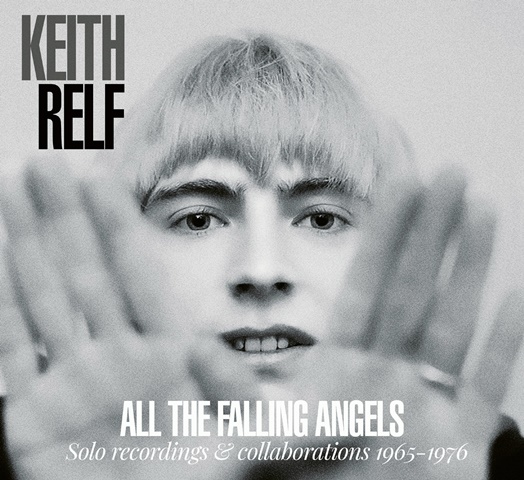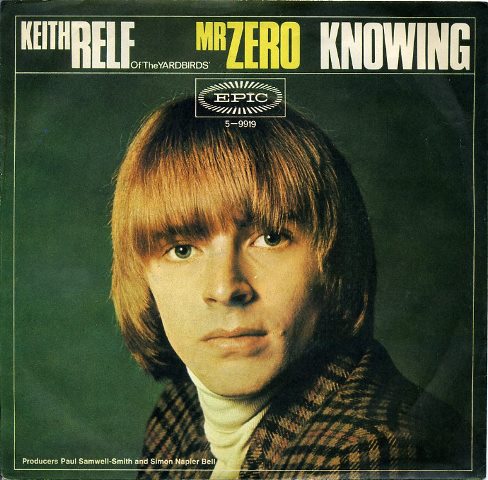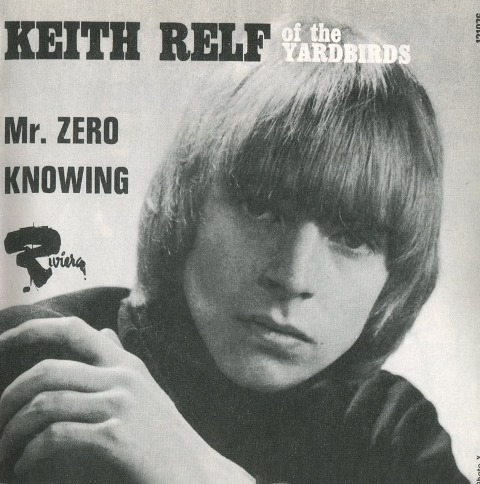Reissue CDs Weekly: Keith Relf - All the Falling Angels | reviews, news & interviews
Reissue CDs Weekly: Keith Relf - All the Falling Angels
Reissue CDs Weekly: Keith Relf - All the Falling Angels
Confirmation that the face of The Yardbirds was a creative force in his own right

“Collector of the Light” is based around what sounds like a treated bass guitar. As the neck is moved up and down, multiple notes are plucked at once. The instrument’s sound is subaquatic, wobbly. Over this, a distant, echoey voice sings of being the “collector of light”, restoring dreams and “silver points of wonder”.
“Sunbury Electronics Sequence”, with its obviously after-the-fact title, is a disconcerting nine-minute mélange of speeded-up snatches of voice – “mar-mi-ii-i-te” – clanking percussion, whooshy sounds, manic laughter, wobbly synthesiser and fuzz guitar. It’s a cousin of The Beatles’ “Revolution 9”.
 Both tracks feature on the illuminating All the Falling Angels: Solo Recordings & Collaborations 1965–1976, a new, first-ever 24-track collection dedicated to what Yardbirds’ frontman Keith Relf was up to on his own while with the band and later. His oft-compiled pair of 1966 solo singles are included but there is little from his post-Yardbirds band Renaissance, and nothing by Medicine Head (who he produced and played with) and Armageddon, the vaguely proggy, metal-esque blues-rock band he issued an album with in 1975.
Both tracks feature on the illuminating All the Falling Angels: Solo Recordings & Collaborations 1965–1976, a new, first-ever 24-track collection dedicated to what Yardbirds’ frontman Keith Relf was up to on his own while with the band and later. His oft-compiled pair of 1966 solo singles are included but there is little from his post-Yardbirds band Renaissance, and nothing by Medicine Head (who he produced and played with) and Armageddon, the vaguely proggy, metal-esque blues-rock band he issued an album with in 1975.
Central to what’s heard is demos, home recordings (including “Collector of the Light” and “Sunbury Electronics Sequence”) and five tracks he made as Together in 1968 with Yardbirds drummer Jim McCarty immediately after their band folded (they issued one single as Together before getting Renaissance off the ground).
 The two tracks mentioned above bear no relation to anything issued by Relf, who died in May 1976. The same applies to the more conventional “Try Believing”. A demo recorded with McCarty in 1970 after the original Renaissance fell apart, it’s gospel-style pop which, bizarrely, could have slotted into the repertoire of Blue Mink. “Just Think What You’re Achieving” (undated, but maybe from around 1968) is more relatable to the Relf of record: a demo with acoustic guitar and plaintive vocal.
The two tracks mentioned above bear no relation to anything issued by Relf, who died in May 1976. The same applies to the more conventional “Try Believing”. A demo recorded with McCarty in 1970 after the original Renaissance fell apart, it’s gospel-style pop which, bizarrely, could have slotted into the repertoire of Blue Mink. “Just Think What You’re Achieving” (undated, but maybe from around 1968) is more relatable to the Relf of record: a demo with acoustic guitar and plaintive vocal.
In 1968 and on the five tracks by Together, Relf and McCarty operate in territory close to Simon & Garfunkel with nods to the Pet Sounds Beach Boys (especially on the wistful “Henry’s Coming Home”). The lightness of Together markedly contrasts with the heaviness and unsublety of the final Yardbirds of earlier in the year. Nonetheless, sketchy, previously unheard demos of late Yardbirds tracks “Glimpses” and “Only the Black Rose” show Relf as an active component of the band while it hurtled towards its dissolution and guitarist Jimmy Page’s formation of Led Zeppelin. Relf was as integral to The Yardbirds’ creativity as any of the band’s ever-lauded guitarists.
 In essence, All The Falling Angels – the title comes from a 1976 recording first issued in 1989: multiple early try-outs are compiled – testifies to untapped or unfulfilled potential. Why on earth was he in the rock-by-rote Armageddon? Keith Relf, it’s now clear, is thoroughly deserving of such a deep-digging examination. However, the release would be more user friendly if the tracklist had dates and sources for all of what's heard. This oversight means that constant scanning through the liner notes is needed to work out what’s being heard. Even so, fans of Relf and The Yardbirds need this.
In essence, All The Falling Angels – the title comes from a 1976 recording first issued in 1989: multiple early try-outs are compiled – testifies to untapped or unfulfilled potential. Why on earth was he in the rock-by-rote Armageddon? Keith Relf, it’s now clear, is thoroughly deserving of such a deep-digging examination. However, the release would be more user friendly if the tracklist had dates and sources for all of what's heard. This oversight means that constant scanning through the liner notes is needed to work out what’s being heard. Even so, fans of Relf and The Yardbirds need this.
Also issued are two Yardbirds archive packages: Live at the BBC Revisited and the confusingly titled Blues Wailing - Five Live Yardbirds 1964, which is not a reissue of the original Five Live Yardbirds album but a remastered, slightly clearer and thinner sounding repackage of the blistering 7 August 1964, Eric Clapton-period Marquee show first released in 2003 as Live! Blueswailing July '64 (the date of the show then was wrongly attributed). This new version eccentrically and pointlessly gives the in-between song stuff its own tracks. Sample title: “Tuning Up (2)”.
Over three CDs, Live at the BBC Revisited is the most extensive Yardbirds BBC release so far. Part of its length is explained by the inclusion of tracks first heard on the 2019 wider-focussed Yardbirds collection Live and Rare. Potential buyers should be aware that: the earliest three tracks do not feature an ill Relf but a guest vocalist instead; the Whole Scene Going TV appearance was of the band miming “Over, Under, Sideways, Down” (it’s rich to include this: it’s what was issued on record) and that the same versions of six tracks are heard twice (in versions with and without the on-air introductions – superfluous completism).
- Next Week: The Pace Setters – the only album by the Eno-produced Ghanaian band Edikanfo
- More reissue reviews on theartsdesk
- Kieron Tyler’s website
Share this article
Add comment
The future of Arts Journalism
You can stop theartsdesk.com closing!
We urgently need financing to survive. Our fundraising drive has thus far raised £49,000 but we need to reach £100,000 or we will be forced to close. Please contribute here: https://gofund.me/c3f6033d
And if you can forward this information to anyone who might assist, we’d be grateful.

Subscribe to theartsdesk.com
Thank you for continuing to read our work on theartsdesk.com. For unlimited access to every article in its entirety, including our archive of more than 15,000 pieces, we're asking for £5 per month or £40 per year. We feel it's a very good deal, and hope you do too.
To take a subscription now simply click here.
And if you're looking for that extra gift for a friend or family member, why not treat them to a theartsdesk.com gift subscription?
more New music
 Solar Eyes, Hare & Hounds, Birmingham review - local lads lay down some new tunes for a home crowd
Psychedelic indie dance music marinated in swirling dry ice
Solar Eyes, Hare & Hounds, Birmingham review - local lads lay down some new tunes for a home crowd
Psychedelic indie dance music marinated in swirling dry ice
 The Lemonheads' 'Love Chant' is a fine return to form
Evan Dando finally gets back in the saddle with an album of new tunes
The Lemonheads' 'Love Chant' is a fine return to form
Evan Dando finally gets back in the saddle with an album of new tunes
 Music Reissues Weekly: Evie Sands - I Can’t Let Go
Diligent, treasure-packed tribute to one of Sixties’ America’s great vocal stylists
Music Reissues Weekly: Evie Sands - I Can’t Let Go
Diligent, treasure-packed tribute to one of Sixties’ America’s great vocal stylists
 'Deadbeat': Tame Impala's downbeat rave-inspired latest
Fifth album from Australian project grooves but falls flat
'Deadbeat': Tame Impala's downbeat rave-inspired latest
Fifth album from Australian project grooves but falls flat
 Heartbreak and soaring beauty on Chrissie Hynde & Pals' Duets Special
The great Pretender at her most romantic and on the form of her life
Heartbreak and soaring beauty on Chrissie Hynde & Pals' Duets Special
The great Pretender at her most romantic and on the form of her life
 The Last Dinner Party's 'From the Pyre' is as enjoyable as it is over-the-top
Musically sophisticated five-piece ramp up the excesses but remain contagiously pop
The Last Dinner Party's 'From the Pyre' is as enjoyable as it is over-the-top
Musically sophisticated five-piece ramp up the excesses but remain contagiously pop
 Moroccan Gnawa comes to Manhattan with 'Saha Gnawa'
Trance and tradition meet Afrofuturism in Manhattan
Moroccan Gnawa comes to Manhattan with 'Saha Gnawa'
Trance and tradition meet Afrofuturism in Manhattan
 Soulwax’s 'All Systems Are Lying' lays down some tasty yet gritty electro-pop
Belgian dancefloor veterans return to the fray with a dark, pop-orientated sound
Soulwax’s 'All Systems Are Lying' lays down some tasty yet gritty electro-pop
Belgian dancefloor veterans return to the fray with a dark, pop-orientated sound
 Music Reissues Weekly: Marc and the Mambas - Three Black Nights Of Little Black Bites
When Marc Almond took time out from Soft Cell
Music Reissues Weekly: Marc and the Mambas - Three Black Nights Of Little Black Bites
When Marc Almond took time out from Soft Cell
 Album: Mobb Deep - Infinite
A solid tribute to a legendary history
Album: Mobb Deep - Infinite
A solid tribute to a legendary history
 Album: Boz Scaggs - Detour
Smooth and soulful standards from an old pro
Album: Boz Scaggs - Detour
Smooth and soulful standards from an old pro
 Emily A. Sprague realises a Japanese dream on 'Cloud Time'
A set of live improvisations that drift in and out of real beauty
Emily A. Sprague realises a Japanese dream on 'Cloud Time'
A set of live improvisations that drift in and out of real beauty

Comments
I have come to appreciate
I have come to appreciate KeithRelf's stellar talent. I originally got into the blues as a result of The Yardbirds. And while I remember the song 'Silver Tightrope' from when it came out on the Armageddon album released in '76, it had a bit of a field day, locally, receiving a lot of airplay. I didn't find out it was Keith Relf as the lead vocalist until two years ago (2021).
I started searching and discovered a lot of the pop-material he recorded with Jim McCarty -much of it very good, just overlooked.
I also learned of a demo he was working on with his sister Jane called 'I'd Love to Love You 'Till Tomorrow'.
https://www.youtube.com/watch?v=yGgrNvFUMJA
Regarding his electrocution, a friend from London told me that while the UK has double the voltage of the U.S., it is twice the amperage....
Thank you for this item on Mr. Relf.